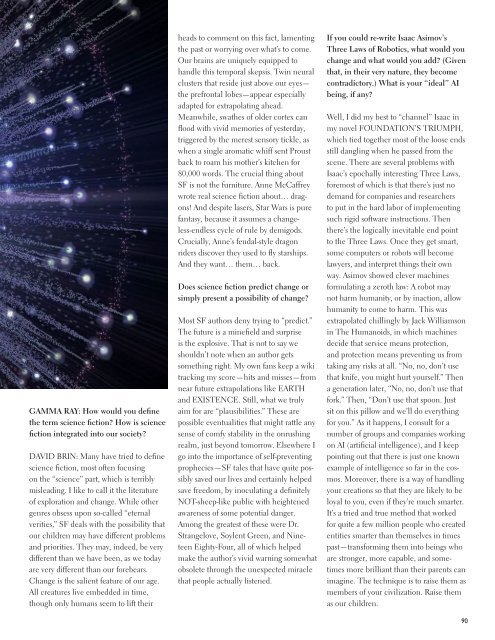Gamma Ray Magazine
Science Fiction | Science Fact | Science Future
Science Fiction | Science Fact | Science Future
- No tags were found...
You also want an ePaper? Increase the reach of your titles
YUMPU automatically turns print PDFs into web optimized ePapers that Google loves.
GAMMA RAY: How would you define<br />
the term science fiction? How is science<br />
fiction integrated into our society?<br />
DAVID BRIN: Many have tried to define<br />
science fiction, most often focusing<br />
on the “science” part, which is terribly<br />
misleading. I like to call it the literature<br />
of exploration and change. While other<br />
genres obsess upon so-called “eternal<br />
verities,” SF deals with the possibility that<br />
our children may have different problems<br />
and priorities. They may, indeed, be very<br />
different than we have been, as we today<br />
are very different than our forebears.<br />
Change is the salient feature of our age.<br />
All creatures live embedded in time,<br />
though only humans seem to lift their<br />
heads to comment on this fact, lamenting<br />
the past or worrying over what’s to come.<br />
Our brains are uniquely equipped to<br />
handle this temporal skepsis. Twin neural<br />
clusters that reside just above our eyes—<br />
the prefrontal lobes—appear especially<br />
adapted for extrapolating ahead.<br />
Meanwhile, swathes of older cortex can<br />
flood with vivid memories of yesterday,<br />
triggered by the merest sensory tickle, as<br />
when a single aromatic whiff sent Proust<br />
back to roam his mother’s kitchen for<br />
80,000 words. The crucial thing about<br />
SF is not the furniture. Anne McCaffrey<br />
wrote real science fiction about… dragons!<br />
And despite lasers, Star Wars is pure<br />
fantasy, because it assumes a changeless-endless<br />
cycle of rule by demigods.<br />
Crucially, Anne’s feudal-style dragon<br />
riders discover they used to fly starships.<br />
And they want… them… back.<br />
Does science fiction predict change or<br />
simply present a possibility of change?<br />
Most SF authors deny trying to “predict.”<br />
The future is a minefield and surprise<br />
is the explosive. That is not to say we<br />
shouldn’t note when an author gets<br />
something right. My own fans keep a wiki<br />
tracking my score—hits and misses—from<br />
near future extrapolations like EARTH<br />
and EXISTENCE. Still, what we truly<br />
aim for are “plausibilities.” These are<br />
possible eventualities that might rattle any<br />
sense of comfy stability in the onrushing<br />
realm, just beyond tomorrow. Elsewhere I<br />
go into the importance of self-preventing<br />
prophecies—SF tales that have quite possibly<br />
saved our lives and certainly helped<br />
save freedom, by inoculating a definitely<br />
NOT-sheep-like public with heightened<br />
awareness of some potential danger.<br />
Among the greatest of these were Dr.<br />
Strangelove, Soylent Green, and Nineteen<br />
Eighty-Four, all of which helped<br />
make the author’s vivid warning somewhat<br />
obsolete through the unexpected miracle<br />
that people actually listened.<br />
If you could re-write Isaac Asimov’s<br />
Three Laws of Robotics, what would you<br />
change and what would you add? (Given<br />
that, in their very nature, they become<br />
contradictory.) What is your “ideal” AI<br />
being, if any?<br />
Well, I did my best to “channel” Isaac in<br />
my novel FOUNDATION’S TRIUMPH,<br />
which tied together most of the loose ends<br />
still dangling when he passed from the<br />
scene. There are several problems with<br />
Isaac’s epochally interesting Three Laws,<br />
foremost of which is that there’s just no<br />
demand for companies and researchers<br />
to put in the hard labor of implementing<br />
such rigid software instructions. Then<br />
there’s the logically inevitable end point<br />
to the Three Laws. Once they get smart,<br />
some computers or robots will become<br />
lawyers, and interpret things their own<br />
way. Asimov showed clever machines<br />
formulating a zeroth law: A robot may<br />
not harm humanity, or by inaction, allow<br />
humanity to come to harm. This was<br />
extrapolated chillingly by Jack Williamson<br />
in The Humanoids, in which machines<br />
decide that service means protection,<br />
and protection means preventing us from<br />
taking any risks at all. “No, no, don’t use<br />
that knife, you might hurt yourself.” Then<br />
a generation later, “No, no, don’t use that<br />
fork.” Then, “Don’t use that spoon. Just<br />
sit on this pillow and we’ll do everything<br />
for you.” As it happens, I consult for a<br />
number of groups and companies working<br />
on AI (artificial intelligence), and I keep<br />
pointing out that there is just one known<br />
example of intelligence so far in the cosmos.<br />
Moreover, there is a way of handling<br />
your creations so that they are likely to be<br />
loyal to you, even if they’re much smarter.<br />
It’s a tried and true method that worked<br />
for quite a few million people who created<br />
entities smarter than themselves in times<br />
past—transforming them into beings who<br />
are stronger, more capable, and sometimes<br />
more brilliant than their parents can<br />
imagine. The technique is to raise them as<br />
members of your civilization. Raise them<br />
as our children.<br />
90




